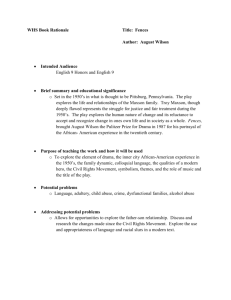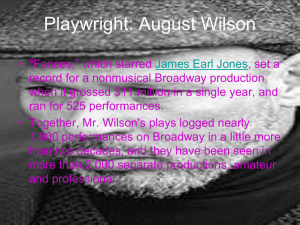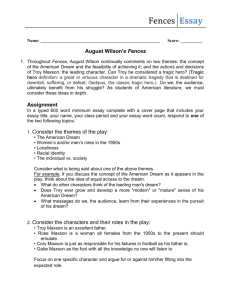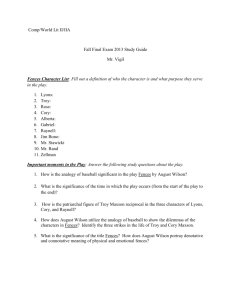Fences Station 1 (Literary Criticism)
advertisement
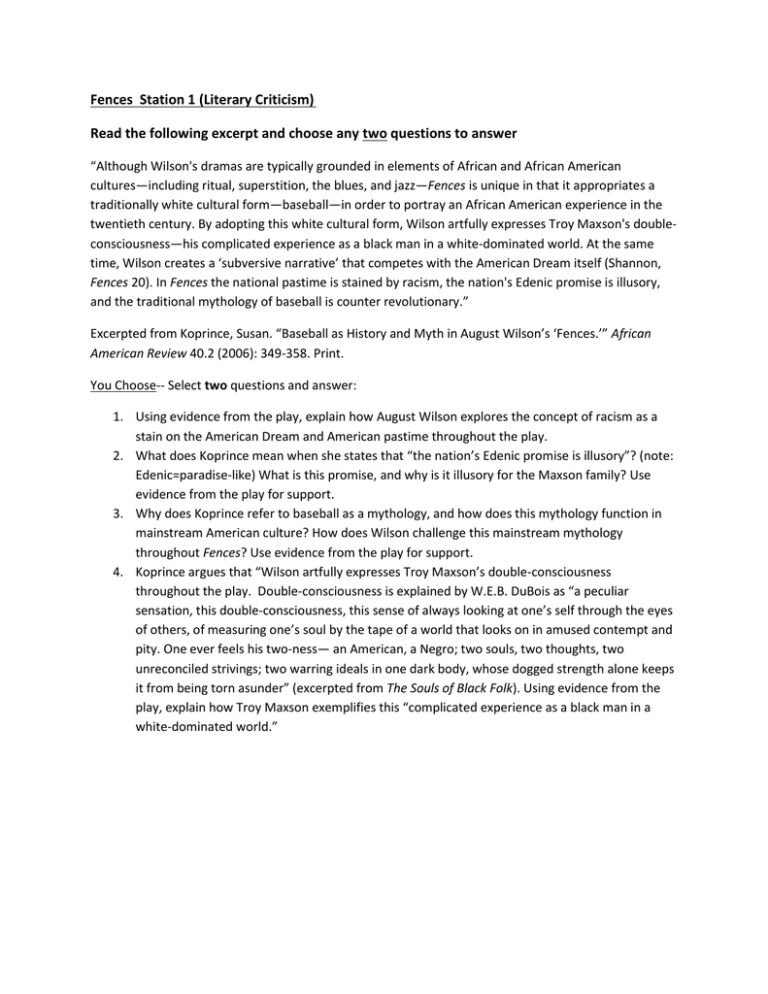
Fences Station 1 (Literary Criticism) Read the following excerpt and choose any two questions to answer “Although Wilson's dramas are typically grounded in elements of African and African American cultures—including ritual, superstition, the blues, and jazz—Fences is unique in that it appropriates a traditionally white cultural form—baseball—in order to portray an African American experience in the twentieth century. By adopting this white cultural form, Wilson artfully expresses Troy Maxson's doubleconsciousness—his complicated experience as a black man in a white-dominated world. At the same time, Wilson creates a ‘subversive narrative’ that competes with the American Dream itself (Shannon, Fences 20). In Fences the national pastime is stained by racism, the nation's Edenic promise is illusory, and the traditional mythology of baseball is counter revolutionary.” Excerpted from Koprince, Susan. “Baseball as History and Myth in August Wilson’s ‘Fences.’” African American Review 40.2 (2006): 349-358. Print. You Choose-- Select two questions and answer: 1. Using evidence from the play, explain how August Wilson explores the concept of racism as a stain on the American Dream and American pastime throughout the play. 2. What does Koprince mean when she states that “the nation’s Edenic promise is illusory”? (note: Edenic=paradise-like) What is this promise, and why is it illusory for the Maxson family? Use evidence from the play for support. 3. Why does Koprince refer to baseball as a mythology, and how does this mythology function in mainstream American culture? How does Wilson challenge this mainstream mythology throughout Fences? Use evidence from the play for support. 4. Koprince argues that “Wilson artfully expresses Troy Maxson’s double-consciousness throughout the play. Double-consciousness is explained by W.E.B. DuBois as “a peculiar sensation, this double-consciousness, this sense of always looking at one’s self through the eyes of others, of measuring one’s soul by the tape of a world that looks on in amused contempt and pity. One ever feels his two-ness— an American, a Negro; two souls, two thoughts, two unreconciled strivings; two warring ideals in one dark body, whose dogged strength alone keeps it from being torn asunder” (excerpted from The Souls of Black Folk). Using evidence from the play, explain how Troy Maxson exemplifies this “complicated experience as a black man in a white-dominated world.” Fences Station 2 (August Wilson, Art, and Culture) Read the excerpts below and answer the corresponding two questions “Wilson was intensely passionate about portraying the truth of the black experience, about being the voice of the ghetto. While he did not set out to create his plays in a series, it became clear to him that his plays in combination were creating a twentieth-century history of the black experience in America. ‘I'm taking each decade,’ Wilson said, ‘and looking at one of the most important questions that blacks confronted in that decade and writing a play about it. Put them all together, and you have a history.’” Excerpted from Gale, Thomson. Contemporary Authors Online, 2006. Web. 1. Using evidence from the play for support, what is “the most important question[] that blacks [are confronting]” in Fences’ 1950s decade? In terms of being the “voice of the ghetto,” Wilson argues that portrayals of the black experience like Bill Cosby’s Huxtable family “is not the whole story.” He argues that “of course, you can go into the ghetto… and ask people what they want—they want decent homes, they want a nice car, they want whatever society has to offer someone who is willing to work. If you can trade your talent and get something, this is what they want. They want to be the Huxtables. But there are no avenues for them to do that. The social contract that white America has given blacks is that if you participate in society, you have to deny who you are. You cannot participate in this society as Africans. Music and sports are the only avenues that are open for full participation of blacks without any further qualifications—you just have to be good.” 2. Wilson articulated this provocative point in a 1988 interview with PBS reporter Bill Moyers. In your opinion, do African-Americans currently have to deny who they are in order for America to accept them? Write an informal journal considering this question. Fences Station 3 (The Tragic Hero) The Classical Tragic Hero, according to Aristotle, must exemplify all of these five characteristics: 1. 2. 3. 4. 5. Usually of noble birth (high class) and male Has a tragic character flaw (usually pride)that eventually leads to his downfall or death Has a reversal of his fate brought about by the hero's tragic flaw His actions result in an increase of self-awareness and self-knowledge The audience must feel pity and fear for this character (catharsis) In the Modernist era (late 19th and early 20th century), a new kind of tragic hero was created out of a result of this "classical" definition. The Modern Tragic Hero, it seems, does not necessarily have to be of a high estate - but rather an "ordinary person." The story may not result in an epiphany of awareness, come to a resolution of catharsis, or end in the death of the hero. The new tragic hero is also known as the "anti-hero" and generally would not be considered a hero outside of the drama’s context. (ex: Jay Gatsby of The Great Gatsby) Is Troy Maxson a classical tragic hero or a modern tragic hero? Argue your point using one of the definitions above, as well as using evidence from the play for support. In addition to establishing your argument with support from the text, refute the side that you oppose, explaining why Troy does not fit within that framework. Fences Station 4 (Baseball Primary Source Documents) Read the early history of American baseball, any two newspaper articles, the death threat to Jackie Robinson, and his “This I Believe” essay. 1. What are Troy Maxson’s ideas about baseball throughout the play? Is he positive or negative about our American pastime? 2. What recorded in our history either confirms or denies his anger and disillusionment throughout the play? 3. What do the newspapers seem to be saying about Robinson joining the “white” major leagues? 4. Would he agree or disagree with Robinson’s “This I Believe”essay? Explain. 5. Write a brief “This I Believe” essay for any one character in the play. Fences Station 5 (Literary Connections) You have probably read Langston Hughes’ “A Dream Deferred” at some point in your high school career. Re-read it and consider the following: 1. Using Hughes’ metaphors for deferred dreams, which of Hughes’ metaphors best describes Rose’s deferred dreams? Explain. 2. Troy’s dreams? Explain. 3. Cory’s dreams? Explain. A Dream Deferred by Langston Hughes What happens to a dream deferred? Does it dry up like a raisin in the sun? Or fester like a sore-And then run? Does it stink like rotten meat? Or crust and sugar over-like a syrupy sweet? Maybe it just sags like a heavy load. Or does it explode? Fences Station 6 (Feminist Context) Rose Maxson is a complex character, particularly for feminists who may see her as playing a doormat to her husband, Troy. Argue whether Rose is a victim of patriarchal oppression or a feminist who is superior to her environment. You may argue from the perspective of Rose’s historical context (1950’s Hill District) or current society’s context, but be sure to identify which lens you are using to analyze her motives. Additionally, consider whether August Wilson is sexist or equitable in this 1986 portrayal of female characters in Fences. Fences Station 7 (Movie/Play Representations of Gender) 1. Using details from the movie The Piano Lesson and the play Fences, examine how gender functions in August Wilson’s works. In reviewing the characters of these two works, explain which character best represents August Wilson’s ideal male and female type. What gender characteristics does he critique in these works? Finally, do you agree or disagree with these portrayals? Are these representations of gender still relevant today, or are they a dated version of how men and women should behave? Be explicit and use the texts for support. 2. August Wilson wrote each of his plays to explore a prevalent issue in the Black community by decade. What are the prevalent issues for the 1930’s decade of The Piano Lesson and the 1950’s decade of Fences? Explain with support from the texts. Even though we did not read The Piano Lesson in class, it may be helpful to use a copy of The Piano Lesson to assist your analysis. Fences Station 8 (Visual Art—Photography) View Teenie Harris’s photography at the Carnegie Museum of Art website http://teenie.cmoa.org/ (I have found this to work best using the Firefox web browser) 1. Click on EXHIBITION IMAGES 2. Click on DATE 3. View photos from the 1951-55 and 1956-60 files (most of Fences is set in the Hill District, 1957) 4. Choose any 3 photos to do a photo essay that ties your selected images to the play 5. Print the photos (you will have to save them and either copy & paste them to a word file or PowerPoint) 6. Type your essay. The essay must explain why the photo is significant to the play and explain of whom or what it reminds you. Use the play to support your analysis.

